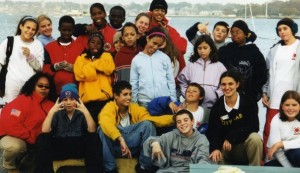A quote that’s resonated with me since my days of volunteering during high school is,“Service is the rent we pay for the privilege of living on this earth.” This was a time when I wasn’t working full time or commuting almost 2 hours a day. It was easy to candy stripe at my local hospital and ship out care packages to soldiers at my church when I had a less stressful schedule.
Though many of us have the desire to volunteer, we do not all have schedules that allow us to spend a few hours at a soup kitchen or to work at a construction site on Saturdays with Habitat for Humanity. Fortunately, there is another way for the civically motivated individual on the go to get involved!
Last year I volunteered with an online mentoring program, In2Books, which matches adult volunteers with elementary school children to discuss books assigned by their classroom teachers. The volunteer’s job is to foster a thoughtful discussion about the books through email in hopes of improving students’ critical thinking skills, writing abilities, and literacy. Throughout the school year volunteers are expected to exchange at least 2 letters per assigned book, so about 10-12 letters, more if you have time.
In2Books is flexible because you can read your book (typically less than 100 pages) on the train or at lunch and then email your pen pal at your leisure. There are email prompts if you’re struggling with topics and also a list of key vocabulary words from the book to incorporate in your email.
For busy Penn students juggling sports practice, double majors, hours in the lab, or work study positions, finding an electronic volunteer position can be a great option. Though volunteering online doesn’t provide the same opportunity to make immediate transformations or connections, like weeding a community garden or spending time at the Ronald McDonald house, my In2Books experience allowed me to stir the curiosity of my pen pal and share my enthusiasm about reading and writing with a captive audience.
As Martin Luther King said, “Everybody can be great because anybody can serve!” With the internet possibilities are endless, so just because you don’t have traditional hours to physically show up with someone, you can definitely find a gratifying volunteer opportunity online!
Author: Lindsay
Cubicle with a View
by Lindsay Mapes
As an administrative assistant I do not have a corner office with a view of Locust Walk. Instead I have a corner cubicle with a view of every move you make before your settle in with your counselor or advisor, and sometimes it’s not pretty. The scenery doesn’t change much when I head down to OCR to check in employers and students for their interviews, either.
 Etiquette starts when you pick up the phone to schedule an appointment or interview. Make sure it doesn’t sound like you’re not standing in the middle of a six lane highway or while you’re leading a kindergarten class in a sing-along. You should also have your calendar handy when you call. Similarly, when you have an appointment or interview over the phone find someplace quiet, with good reception and free from interruptions. We actually had a student call for her scheduled phone appointment while she was on a bar crawl. Not only is it disrespectful to who you’re speaking with, but it hampers the quality of your appointment and what you get out of it.
Etiquette starts when you pick up the phone to schedule an appointment or interview. Make sure it doesn’t sound like you’re not standing in the middle of a six lane highway or while you’re leading a kindergarten class in a sing-along. You should also have your calendar handy when you call. Similarly, when you have an appointment or interview over the phone find someplace quiet, with good reception and free from interruptions. We actually had a student call for her scheduled phone appointment while she was on a bar crawl. Not only is it disrespectful to who you’re speaking with, but it hampers the quality of your appointment and what you get out of it.
Whether you’re interviewing in OCR, meeting with an advisor at Career Services, or headed to an unfamiliar city for an interview, make sure you know where you’re going. That doesn’t mean having an address scrawled on a wrinkled piece of paper. Career Services is tucked away in the basement of the McNeil Building. Tons of students show up late for interviews in OCR or appointments in Suite 20 because they don’t know where they’re going. Google the address before you go. Also, administrative assistants are happy to give directions! If you had an interview in Manhattan you wouldn’t just show up at the train station, then try to figure it out on your own and call 10 minutes after your appointment begins breathless and lost?
If you are going to be late, call as soon as you know. If you’re not going to show up at all, you should also call or email as soon as you know. As redundant as this advice seems, it’s surprising how many students simply do not show without advance notice. I notice and so do the advisors, especially the frequent no-shows. Interviewers and advisors are very busy, as are you, so if you let them know well in advance they may be able to accommodate you for another time. Blatant no-shows do not guarantee any accommodations.
When you do show up on time to your interview or appointment you should know what company you’re interviewing for or who you’re meeting with. This prevents you from sounding like a disorganized person who doesn’t want to be there. There’s no Anne Redstorm or Ted Rothum here.
Be aware of your surroundings when you’re in the waiting area, especially in OCR. Sometimes when people get nervous they get chatty, and then they get loud. Other students (and interviewers) may not want to hear how your last interviewers thought you were perfect. People also probably aren’t interested in hearing a phone conversation about how much you drank over the weekend. Be considerate. If the three people in the waiting area with you are exchanging looks and rolling eyes at each other, you might want to stop playing Angry Birds with your sound on.
Administrative assistants and receptionists are here to help you from the moment you pick up the phone or come in to make an appointment. Do not hesitate to ask for directions, to call when you’re running late, or to see if we can schedule you for a different day. And Lifesavers! We have Lifesavers! Could someone with a basket of Lifesavers steer you wrong?
A Year On, Not a Year Off
by Lindsay Mapes
My academic motivation in high school did not follow me to college. Freshman and sophomore year I struggled through classes, or it’d be more accurate to say I struggled to make it to any class. I didn’t know why I was in college other than my parents (and most everyone else) told me I was supposed to go. Of course I knew eventually I would head to college, either in Elle Woods or Will Hunting fashion, but after graduating high school I just didn’t feel ready. Still, I went because that’s what kids in my town did. The first two years I practically failed out. It was comical that such a smart girl was wasting an expensive academic experience (Right dad? We’ll look back and laugh after the student loans are paid off.)
During the middle of my sophomore year of college I realized before I tried to pass my biology requirement for a third time I needed to take time off to get my priorities straight, to mature and recharge. I didn’t want to go back to Central Jersey and live with my parents and work at the movie theater as I had done during high school, I really wanted to do something. The only thing I still had remaining from high school was my dedication to community service. With help from my mom I searched the internet for international service programs. Unfortunately most programs required I pay them to serve, whereas I needed income, as meager as it might be. I narrowed my search to the states and was fortunate to find out about City Year.
City Year is an AmeriCorps program that unites idealistic 17-24 year olds in a year of powerful service in 20 cities around the country. Volunteers, or corps members as we were called, work at schools in underserved communities tutoring, mentoring, and teaching. Corps members also perform a significant amount of transformational service including working in community gardens or painting murals. Sounds like your typical service program, right?

Well, City Year is a little different. Unfortunately I have to compare it to joining a cult. Instead of Nike Widerunners and a glass of Kool Aid, you received a uniform provided by Timberland consisting of boots, khakis, a team shirt with your sponsors’ names, and a bright red jacket (or yellow in Los Angeles or San Jose as red is a dangerous color to wear because of gang activity in the area). When I served as a corps member in 2002-2003 in Rhode Island we had to meet requirements in order to earn a uniform. Besides completing a certain amount of training and service with our team we had to demonstrate knowledge of City Year physical training exercises and recite various AmeriCorps and City Year creeds.
The physical training, or PT, was CY sanctioned exercises that all new corps members initially looked at as ridiculous (City Year Slap-Happies? Just call them jumping jacks!). PT is very low impact and barely makes you break a sweat (except those who are embarrassed about doing City Year Foot Fires in a public place…and it is always done in public), but is meant to demonstrate discipline, purpose, pride and power. City Year culture is part of what makes the program so successful and so meaningful. Standards were high (a fellow corps member was sent home for not having creased khakis, another written up for chewing gum, and you were required to cross at a crosswalk when the signal read walk even if you were running late), but for a reason. We were a young organization providing critical service in at-risk communities. In order to be taken seriously we needed to present ourselves as disciplined, purposeful, prideful, and powerful young adults.
The culture strengthened our team relations and our ability to lead. Though we were incredibly diverse, we had a common goal, to effectively serve a community in need. City Year gave me so many opportunities to lead my fellow corps members and work with influential community members. City Year also taught me how to communicate. After a long day of working in schools and at after school programs all we wanted to do was go home. Despite that longing our team usually ended up spending another hour constructively and passionately discussing the day’s drama and successes with the children, children’s families, and team members. Some days there was crying about disparities in the community, other days there was venting about corps members. We always left with a resolution or a hug. My team became my family; we supported each other and pushed each other to succeed.
Taking a year off was a difficult decision, especially since my dad thought doing a year of service was tantamount to dropping out of school and joining the circus, but it was certainly one of the most difficult and gratifying experiences I’ve had. My year of service was inspiring and motivating. When I returned to school I took biology for the third time and passed, and I even made the dean’s list numerous times! I became more active in the community and more importantly I cared about what I was learning in school.
It’s summertime, maybe you’re on a beach vacation dreaming about your future or stuck at a boring office internship wondering where your youth went (thoughts can become pretty outrageous after 4 hours in front of Excel), whatever the scenario, if you’re wondering what to do with your life, consider dedicating a year to service. From creating curriculum for elementary school children to participating in round table discussions with political and community figures, my AmeriCorps experience provided me with so many skills that I wouldn’t have gained elsewhere. If working with children doesn’t interest you, AmeriCorps offers many different programs. One example is the National Civilian Conservation Corps, a program that primarily provides transformational service in different regions around the country, which is a great fit for someone who enjoys traveling and has a propensity for manual labor (you’re not going to get pecs pushin’ paper in an office). AmeriCorps programs offer a meager salary (my team and I were on food stamps), but you do receive an education award of about $5000 after your year of service which some schools will even match!
This blog is pretty long and I hope that if you did not read the entire post you at least skipped to the end (though that means you missed the riveting rising action, very exciting climax, and the oh-so-dramatic falling action), where I tell you I loved my AmeriCorps experience and love to talk about it, so don’t hesitate to stop by the office or shoot me an email if you have any questions about AmeriCorps, City Year, or how to tell your parents making $120 a week doing community service is a good idea. However, if you’re looking for insight on biology courses, despite taking it 3 times I can’t help you.





